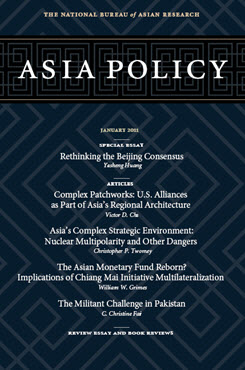The Asian Monetary Fund Reborn?
Implications of Chiang Mai Initiative Multilateralization
This article analyzes the current implications and likely future course of Chiang Mai Initiative Multilateralization (CMIM), which some observers have argued is a major step toward the creation of an Asian monetary fund (AMF) that would be fully autonomous from the IMF.
EXECUTIVE SUMMARY
MAIN ARGUMENT
Like the previous version of the Chiang Mai Initiative (CMI), CMIM seeks to provide an efficient and credible mechanism for offering emergency liquidity to ASEAN +3 economies in currency crises. “Multilateralization” in this case means the creation of formal reserve pooling arrangements, a weighted voting system for disbursement of funds, and enhancement of surveillance capabilities.
CMIM differs in fundamental ways from the AMF concept. Much attention has been given to the establishment of weighted voting for disbursement of funds, but in fact CMIM maintains the CMI’s existing “IMF link,” whereby crisis countries are able to access the bulk of their line of emergency credit only after having already entered into negotiations with the IMF for a stand-by agreement. Technocratic advocates of delinking CMIM from the IMF have looked to surveillance measures within ASEAN +3 to replace IMF surveillance and conditionality. In contrast, this article argues that the need for third-party enforcement through the IMF link arises from the politics of Sino-Japanese rivalry and therefore cannot be eliminated through institutional measures.
POLICY IMPLICATIONS
- Though East Asian economies avoided currency crises during the 2008–10 global financial crisis, the crisis offers many lessons. The near-crisis in South Korea, which was managed mainly through a temporary swap agreement with the U.S. Federal Reserve, revealed gaps in CMI and CMIM coverage. The 2010 Greek crisis demonstrated anew the dangers of depending on regional surveillance and enforcement mechanisms for financial and currency stability.
- U.S. interests are not threatened by CMIM, even though the process specifically excludes the U.S. from direct involvement, because the institutional need for the IMF link ensures for the time being that CMIM will remain nested within global institutions.
- The U.S. should engage ASEAN +3 governments in ongoing regional and global discussions of how currency crises can best be prevented and managed.
About Asia Policy
Asia Policy is a peer-reviewed scholarly journal presenting policy-relevant academic research on the Asia-Pacific that draws clear and concise conclusions useful to today’s policymakers. Asia Policy is published quarterly in January, April, July, and October and accepts submissions on a rolling basis. Learn more


